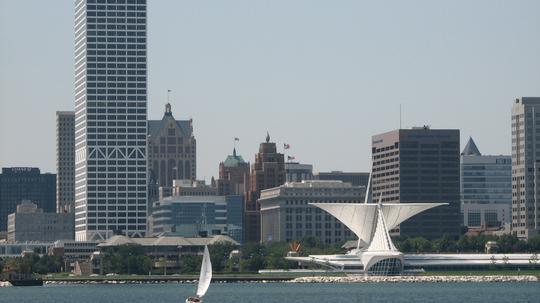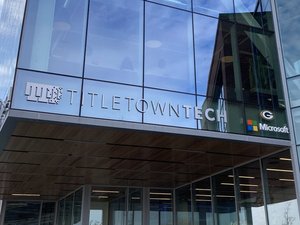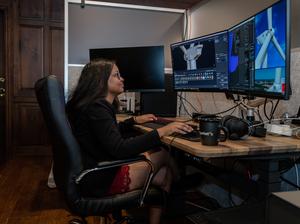
This post originally ran in November, '16 as part of our 'Inno on the Road' Series.
AOL founder Steve Case talks often about the "third wave" of the internet, specifically, how cities outside of Silicon Valley can become hubs of innovation and foster a thriving community of digital startups.
And Milwaukee, a city of 600,000 just 90 minutes north of Chicago, is desperately trying not to get left out of the startup conversation. But as Milwaukee works to catch up to the tech activity happening in Chicago, or even in nearby Madison--which has seen more then 3 times the number of venture deals in the last two years--there are some factors standing in its way. A 2016 Kauffman Index report ranked Milwaukee 39th out of 40 in a measure of startup activity in America's largest cities. The ranking looked at factors like the rate of new entrepreneurs and startup density. The state of Wisconsin as a whole didn't fair any better, as it came in last out of the 25 states measured in the study.
But to entrepreneurs and technology leaders in Milwaukee, these numbers only tell part of the story. They see a city ripe with resources to help startups grow, and a place that's increasingly becoming a destination for technology companies to relocate their business.
In the last two years startups like Boston-based Bright Cellars, San Francisco-based Lumanu and Washington DC-based Exit 7C have all decided to relocate and call Milwaukee home after taking part in the local Gener8tor accelerator program. Gener8tor, which launched in 2012 and operates programs in both Milwaukee and Madison, has been a focal point of the region's burgeoning startup scene; the program was ranked a top accelerator of 2016 at SXSW. After taking part in Gener8tor's 12-week accelerator, alumni companies have gone on to raise an additional $100 million in funding. And the program is clearly a catalyst for bringing tech startups to Milwaukee. Chicago parking startup ParqEx, which was part of Gener8tor's most recent Milwaukee class, now plans to open operations in Madison and Milwaukee.
"Part of (being in Milwaukee) is you get a real boost from coming to a market where, as a new startup founder, you get a higher profile than I think you might get in other cities," said Gener8tor co-founder Joe Kirgues. "They come here, and that helps them with their hiring. It helps them get more press. It helps them establish their brand in the marketplace.
"As these founders move here, they realize that it opens up all sorts of doors that might not have been opened in other places, and they build on that to their advantage."
Bright Cellars, a subscription wine delivery startup born out of MIT, wasn't planning to move to Milwaukee when it was accepted to Gener8tor last year. But when the company's first three hires were all from the area, and it had an opportunity to move into the new Ward4 building, a tech hub modeled after Chicago's 1871, it decided to turn its 3-month stay into a permanent headquarters.
"We didn't even know where Wisconsin was when we first heard about it," Bright Cellars co-founder Richard Yau said. "There are not a lot of startups in Milwaukee, but we are here kind of at the beginning. I think we're just hitting the point of inflection for the startup community here, which is exciting."
The center of the startup energy in Milwaukee exists inside Ward4, a co-working and dedicated office space inside the Pritzlaff building complex just south of downtown that houses Gener8tor, Bright Cellars and other tech tenants. Funded by Milwaukee VC firm CSA Partners, Ward4 serves as the "central nervous system" of the Milwaukee tech community, Kirgues said, connecting entrepreneurs, investors and the corporate community.
"The idea for Ward4 emerged from people who toured Chicago and saw 1871 and the facilities there," he said. "It's been fantastic to have entrepreneurship in the area have an address and physical location that you can go to."
Ward4 was buzzing last week as the city hosted its inaugural Milwaukee Startup Week, a series of events and meetups designed to connect the innovation community in Milwaukee. Matt Cordio, the event organizer and co-founder of non-profit Startup Milwaukee, said the goal is to highlight what’s happening in the city's technology and entrepreneurship scenes.
"There is an ecosystem here, but we still have a lot of room for improvement in terms of getting our startup rates up and getting Milwaukee dialed in to the next wave of innovation," Cordio said. "We don’t think of ourselves as a tech hub, and I think we are. And we need to own it, and get the word out."
A History of Entrepreneurship
Milwaukee has a long history of entrepreneurship, with pillar companies like Kohl's, Miller, Harley Davidson and Brigs & Stratton all based in Milwaukee and have become household names.
But Milwaukee is also home to successful technology companies that you've probably never heard of, like DRS Power and Control Technologies. DRS has been a contractor to the U.S. Navy since the 1940s to help put computers on nuclear submarines and operates a 650,000 square foot facility in Milwaukee.
DRS, in some ways, can be seen as a metaphor for Milwaukee's historical technology scene, according to Teresa Esser, an investor at Silicon Pastures, an angel investment group in Milwaukee.
"If you’re manufacturing nuclear submarines, you’re role is to stay under the water. It's about being quiet," Esser said. "Loose lips sink ships."
"A lot of people do not know what we have here," she added. "A lot of people don’t know the strength of our region."
This secrecy is intentional, Esser says, as many of the area's high-tech companies aren't interested in generating press or "celebrating wins" as is often customary in today's tech world. Companies like Milwaukee's Metavante, a banking software company that was formed as a subsidiary of the Marshall & Ilsley Corporation, employed over 5,600 employees in 35 cities. It was acquired by Fidelity National Information Services in 2009.
"Software for banking, it's not sexy. You actively want to not think about it," Esser said. "The strength of our region is reliability and trust. Since things work well here and since you can trust us, you don’t have to think about it. That's success."
Milwaukee certainly has tech exits worth boasting about. Toshiba bought ReGENco in 2007. Liberty Media, which owns QVC, bought BuySeasons in 2006. BuySeasons owned online retailer BuyCostumes.com and was founded by Jalem Getz, who's used that money to launch a new startup in Milwaukee called Wantable, an e-commerce subscription box startup for women's fashion; Cosentry, an Omaha-based information technology company acquired data center Red Anvil in 2014; and Florida-based Intermedix bought EMSystems, an emergency medical services software provider, in 2010.
A lot of people do not know what we have here. A lot of people don’t know the strength of our region."
As Milwaukee looks forward, local tech leaders and entrepreneurs hope to see more startup activity in the area, more capital from both inside and outside of Milwaukee flow into the city's startups, and to continue establishing the city as a destination for new tech companies.
"In the next 5 to 10 years, you're going to see more Series A rounds from institutional partners from the Chicago area and national invest in the city," Kirgues said, adding that he's hoping more startups will choose Milwaukee as a place to grow their startup.
"It's refreshing for us that outsiders come here and see this as a place they want to start their career," he said.
Featured image via Creative Commons








